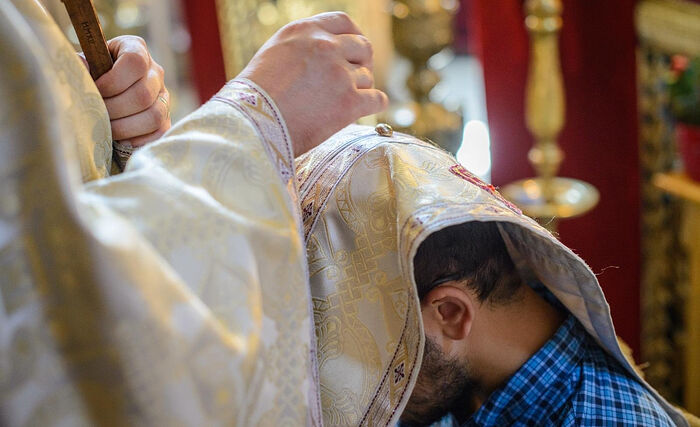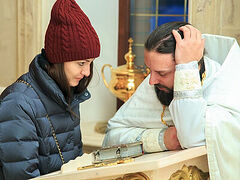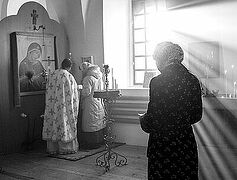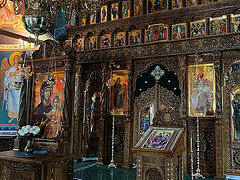Come now, and let us reason together, saith the Lord: though your sins be as scarlet, they shall be as white as snow; though they be red like crimson, they shall be as wool (Is. 1:18).
With these words the Prophet Isaiah predicted the miracle that occurs before our eyes every day—the purification of the human soul in the sacrament of repentance. We do not see the great and terrible thing that mysteriously happens in front of the analogion, but God’s saints saw it.
“And the Prophet Isaiah proclaimed how sinners and penitents can be delivered from sins,”1 the holy Martyr Justin the Philosopher writes about this prophecy in his Apology.
More than that, in his Catechetical Lectures to Those Who Are to Be Enlightened, the Holy Hierarch Cyril of Jerusalem reveals to us:
“He says, shall be as white as snow and …they shall be as wool. By this He means the remission of sins or even a sinless state.”
Traditions carefully preserved by the Church tell us about the power of the sacrament of confession and that God’s mercy really does instantly and entirely erase all the sins of those who repent sincerely…
A penitent robber
St. John Climacus wrote that during his stay at a cenobitic monastery near Alexandria, a robber came to that monastery to repent and receive the monastic tonsure. “This wonderful physician, using all means for his salvation, and wishing to give to all an example of saving and effectual humility, again exhorted him, in the presence of all, to tell in detail what he had done. And with terror he confessed one after another all his sins, which revolted every ear, not only sins of the flesh, natural and unnatural, with rational beings and with animals, but even poisoning, murder and many other things which it is indecent to hear or commit to writing. And when he had finished his confession, the shepherd at once allowed him to be given the habit and numbered among the brethren.
“Amazed by the wisdom of that holy man, I asked him when we were alone: ‘Why did you make such an extraordinary show?’ That true physician replied: ‘For two reasons: firstly, in order to deliver the penitent himself from future shame by present shame; and it really did that, Brother John. For he did not rise from the floor until he was granted remission of all his sins. And do not doubt this, for one of the brethren who was there confided to me, saying: “I saw someone terrible holding a pen and writing-tablet, and as the prostrate man told each sin, he crossed it out with a pen.” And this is likely, for it says: I said, I will confess against myself my sin to the Lord; and Thou hast forgiven the wickedness of my heart (Ps. 31:5). Secondly, because there are others in the brotherhood who have unconfessed sins, and I want to induce them to confess too, for without this no one will obtain forgiveness2.”
The Testimony of the Angels
Once the Venerable Theodora appeared in a vision to Gregory, a disciple of the Venerable Basil the New, and told him about the aerial “toll-houses” that her soul had gone through after her death. She also told him that, in awe and horror of what was happening to her, ascending from one “toll-house” to another, she asked the holy angels:
“Is it for every sin which a man commits in life that he is tormented with at the trials, or if it is possible, even during life, to expiate the sin in order to be cleansed of it and not be tormented with it at the trials?
“The angels told Saint Theodora that not all experience the trials in that way, but only those like her who did not make a heart-cleansing confession before death.
“Whoever strives diligently for repentance, always receives forgiveness from God, and also unencumbered passage from this life to the blessed life beyond the grave. The evil spirits, which are here during these trials with their records, open them and find nothing written, because the Holy Spirit will make invisible everything that is written. They know that everything written by them is wiped out, thanks to Confession, and they are deeply saddened... Truly great is the saving power of Confession! It saves one from much woe and distress, it provides the possibility to go through all the trials without hindrance and come to God.”3
Healing by repentance
Speaking about the power of confession, the Holy Hierarch Ignatius (Brianchaninov) cites a remarkable story in his Homily on Death:
“It would be useful to mention here an event that is almost contemporary to us. There is a large village called Kubenskoye in the vicinity of the city of Vologda, which has several parishes. One of the parish priests became ill, and approaching his death, saw his bed surrounded by demons who were preparing to seize his soul and take him down to hell. Then three angels appeared. One of them stood at the bedside and began to argue about the priest’s soul with a very hideous demon, who was holding an open book in which all of the priest’s sins were recorded.
“Meanwhile, another priest came to administer the last rites to his brother priest. Confession began; the dying priest, fixing his frightened eyes on the book, uttered his sins with self-denial, as if spewing them out of himself—and what did he see? He saw clearly that once he pronounced a sin, that sin disappeared from the book, leaving a blank in its place. Thus, by confession he erased all of his sins from the demonic book, and having been healed, he spent the rest of his life in deep repentance, sharing with his neighbors for their edification his vision and miraculous healing.”
“They have become like God”
The Ancient paterikon relates the vision of a bishop, to whom spiritual vision was once given during a Liturgy. When Christians “approached the Holy Chalice to receive Holy Communion, through their faces he saw their souls and the sins they were prone to; he saw that the faces of some were like soot, others had faces like a flame, and bloody and fiery eyes; and he saw that others had light faces and were dressed in white robes.”
Among those who approached the Chalice there were two noble women, of whom the bishop knew that they led unchaste lives. However, to his astonishment, he saw that
“as they drew near the Holy Mysteries, they had bright and honorable faces, and were clothed in white robes. Then, when they received the Holy Mysteries of Christ, they shone as if from light."
After the service the bishop prayed to God to understand the revelations shown to him. Then an angel appeared to him and answered that the women who had previously been sinners, when approaching the Holy Chalice, “were fair in face, had white robes, and shone with light greatly because they had become conscious of what they had been doing and promised to abandon it,” and for tearful repentance, good works and confession, “they have become like God, their sins have been forgiven, and they will live chastely, righteously, and piously for the rest of their lives.”
The bishop marveled not so much at the change in the women as at the mercy of God, Who not only had delivered them from punishment, but had also vouchsafed them such great grace. The angel answered him:
“Are you surprised by this? Rightly so—you are a human being, and our Lord is good by nature and the Lover of mankind. Not only does He not send those who abandon their sins and fall down before Him with confession to the torments, but He also appeases His anger on them and vouchsafes them honors. For God so loved the world, that He gave His only begotten Son, that whosoever believeth in Him should not perish, but have everlasting life (Jn. 3:16). Therefore, He who deigned to die for His enemies all the more remits the sins of those who have become His own and repent of what they have committed, vouchsafing them to take pleasure in what is prepared for them. Know firmly that no human sin will overcome God’s love for mankind if only people by repentance make up for the evil deeds they committed before. For, being the Lover of mankind, God knows the weaknesses of your kind, the power of the passions, and the devil’s cunning, and when people fall into sins, He forgives them as His children, and expects reform, long-suffering for them. He shows compassion to those who repent and beg for His mercy as to the weak, immediately delivering them from punishment and granting them the blessings prepared for the righteous4.”




